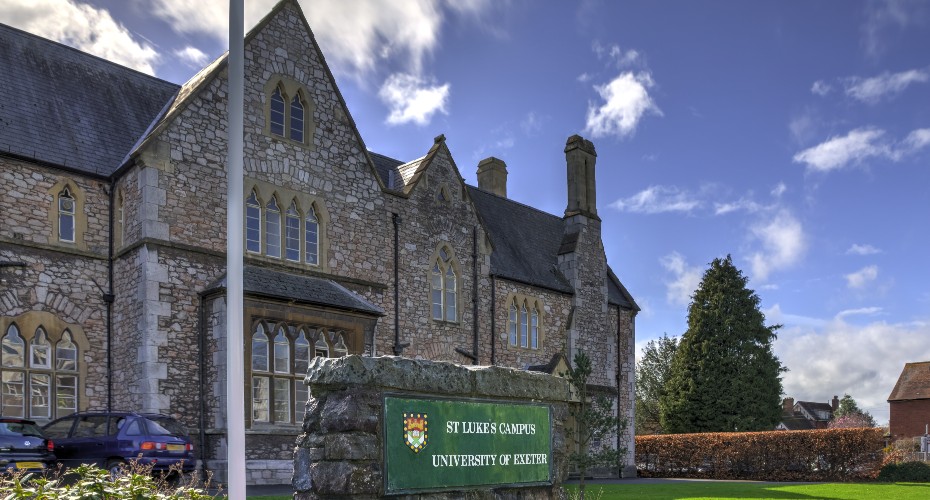Public engagement on plans to create a world-leading centre of health and wellbeing excellence at St Luke’s

The University of Exeter is seeking a wide range of views to help shape an ambitious vision to redevelop its St Luke’s Campus over the next decade and enhance its reputation as a world-leading centre of excellence for health and wellbeing research and education.
A public engagement event will invite views from colleagues, students, and the public as the University begins to draft a vision to redevelop the St Luke’s site. The new plans will boost health-related education and research, directly benefitting the local community. In addition to this, the plans aim to greatly improve the look of the historic site by retaining listed buildings, whilst creating a modern and biodiverse landscape that will enhance the campus’ role in the area.
St Luke’s was founded in 1854 as a teacher training college, an activity that is still going strong through the University’s School of Education. The campus has a proud 160-year history of delivering high-quality research and training, with an increasing focus on health and wellbeing since the University of Exeter Medical School was established a decade ago. Now, the campus also houses the Academy of Nursing, and activities including biomedical, public health, the UK’s number one sports and health sciences research groups, as well as the training of the next generation of nurses, doctors, medical scientists, and radiographers.
The University’s health and wellbeing research has already led to a number of significant global breakthroughs, meaning better diagnosis and treatment in key areas. Specific examples include new ways of treating babies with neonatal diabetes across the world, finding new ways of diagnosing cancer to improve survival rates, and better ways of caring for people with early-stage dementia.
In partnership with Royal Devon University Healthcare NHS Foundation Trust, the University has also established the UK’s first National Rapid Whole Genome Sequencing (WGS) Service, which has revolutionised the diagnosis of children and babies with rare genetic diseases across the UK. And the region’s first ever National Institute for Health and Care Research (NIHR) Exeter Biomedical Research Centre. The first of its kind in the South-West peninsula, the new centre aims to make scientific discoveries that have the potential to make a real difference by ensuring key breakthroughs are rapidly adopted to benefit patients.
The new vision for the campus aims to build on the close proximity to key partner the Royal Devon, to help stimulate an expansion of health-related activity, which would mean health and economic benefits for the area.
Professor Lisa Roberts, President and Vice Chancellor of the University of Exeter, said: “Having a thriving medical school in the heart of Exeter has already yielded huge benefits to the city, as well as to the population of the South-West and beyond. We want to continue to grow and enhance the life-changing research and crucial health and care training we provide. To do this we need to create the facilities and environment for a health and wellbeing campus capable of powering breakthroughs that will result in new ways of treating people in the region, and across the world. We’re keen to hear the views of as many people as possible so they can help to shape the very early stages of our planning, as we look at which areas of our historic campus to develop over the next decade.”
Professor Richard Smith, Deputy Pro-Vice-Chancellor for planning and projects in the Faculty of Health and Life Sciences, said: “Over the last decade, we’ve built an outstanding reputation for our health and wellbeing research and teaching which has provided benefits on a regional, national and international scale. As we continue to grow our strengths in this area, we need to ensure our facilities are modern, suitable, and sophisticated so we can progress our research into tangible benefits and to train the next generation of change-makers. This is particularly essential as we work with our NHS partners to ensure we’re ahead of the game on the pressing need to train high-calibre health professionals to meet future need.”
The University’s strong partnership with the Royal Devon University Healthcare NHS Foundation Trust encompasses the training and development of healthcare professionals, research collaborations with scientists and academics, and state-of-the-art facilities provided in partnership at the RILD building. This includes nationally-accredited laboratories, the new NIHR Exeter Biomedical Research Centre and the NIHR Exeter Clinical Research Facility.
Paul Roberts, Interim CEO for the Royal Devon University Healthcare NHS Foundation Trust, said: “Our strong partnership with the University of Exeter creates opportunities for delivering cutting-edge research and pioneering innovation, supporting us to offer world-class training and career development to our professionals.
“Redeveloping St Luke’s will enhance these opportunities and allow us to set out an exciting vision for healthcare education and research here in Exeter, which is positive for our colleagues, future trainees and our community.”
The public engagement event be an opportunity to hear your views about our plans and will take place on:
Thursday 16 November from 13:00 to 20:00, first floor of Cross Keys, St Luke’s Campus.
The location can be found on the St. Luke’s Campus map (Cross Keys in number three on the map). The building has disabled access.
The local community, University colleagues, and students will be able to view information on the future vision for St Luke’s and the proposed redevelopment area. The project team will be on hand to answer any questions and attendees can provide feedback at the event or online.
The engagement event materials will be available to view on the University’s website and an online feedback form will be live from Friday 17 November until the end of the engagement period on Thursday 14 December: www.exeter.ac.uk/stlukesredevelopment/
Following the event and engagement period, the project team will reflect on the feedback received. In early 2024, a public exhibition will be arranged that will provide an opportunity to view and comment on the emerging proposals before they are submitted to Exeter City Council for consideration in spring 2024.



